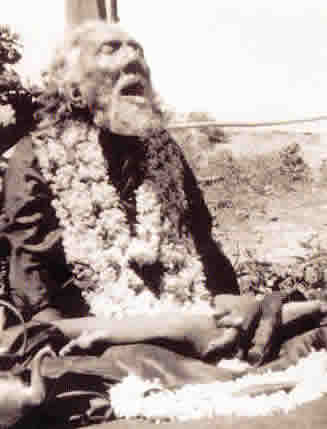Swami Sri Yukteswar was born on
May 10, 1855, at Serampore in Bengal, India.
Sri Yukteswar about his life: "My family name was Priya Nath Karar. I was born here in Serampore, where Father was a wealthy businessman. He left me this ancestral mansion, now my hermitage. My formal schooling was little, I found it slow and shallow. In early manhood, I undertook the responsibilities of a householder, and have one daughter, now married. My middle life was blessed with the guidance of Lahiri Mahasaya. After my wife died, I joined the Swami Order and received the new name of Sri Yukteswar Giri.t Such are my simple annals."
Swami Sri Yukteswar entered
mahasamadhi on
March 9, 1936, during Paramahansa Yogananda's visit to India after fifteen years in America. Three months later, in Bombay, Yoganandaji was blessed to behold his guru in resurrected form.
Sri Yukteswar was a disciple of
Lahiri Mahasaya and attained the spiritual stature of a
Jnanavatar, or incarnation of wisdom. It was to Sri Yukteswar that Paramahansa Yogananda came as a youth. Under Sri Yukteswar's spiritual training and discipline, Sri Yogananda was prepared to begin his worldwide mission in the West. Sri Yukteswar named Paramahansa Yogananda sole heir to his spiritual mantle and ashram properties.
Of his guru Paramahansa Yogananda said: "His every utterance was chiselled by wisdom. . . . The essence of truth, all-pervasive with even a physiological aspect, came from him like a fragrant exudation of the soul.. . .
His feet were firm on the earth, his head in the haven of heaven." "Sri Yukteswar fitted the Vedic definition of a man of God: 'Softer than the flower, where kindness is concerned; stronger than the thunder, where principles are at stake.'"
W. Y. Evans-Wentz, M.A., D.Litt., D.Sc., noted scholar and author, wrote these words in a Preface to
Autobiography of a Yogi: "It has been my privilege to meet ... Sri Yukteswar Giri... He questioned me concerning the distant activities, particularly those in California, of his chief disciple, Paramahansa Yogananda, whom he dearly loved, and whom he had sent, in 1920, as his emissary to the West. ... I am glad, indeed, to be able to record this testimony to the high character and holiness of Sri Yukteswar. Content to remain afar from the multitude, he gave himself unreservedly and in tranquility to that ideal which Paramahansa Yogananda, his disciple, has now described for the ages."
TIMELESS WISDOM
Sri Yukteswar: Forget the past. The vanished lives of all men are dark with many shames. Human conduct is ever unreliable until man is anchored in the Divine. Everything in future will improve if you are
making a spiritual effort now.
The darkness of maya is silently approaching. Let us hie homeward within.
(With these cautionary words Sri Yukteswar constantly reminded his disciples of their need for
Kriya Yoga.)
Remember that
finding God will mean the funeral of all sorrows.
Wisdom is not assimilated with the eyes, but with the atoms. When your conviction of a truth is not merely in your brain but in your being, you may diffidently vouch for its meaning.
The rishis wrote in one sentence profundities that commentating scholars busy themselves over for generations. Endless literary controversy is for sluggard minds. What more quickly liberating thought than ‘God is’ - nay, ‘God’?
But man does not easily return to simplicity. It is seldom ‘God’ for an intellectualist, but rather learned pomposities. His ego is pleased, that he can grasp such erudition.
Destroy wrong desires now; otherwise they will remain with you after the astral body has been separated from its physical casing. (...) Every natural passion can be mastered.
A true devotee is finally freed from all instinctive compulsions. He transforms his need for human affection into aspiration for
God alone - a love solitary because omnipresent.
Forget the outward symbols of renunciation, which may injure you by inducing a false pride.
Nothing matters except your steady, daily spiritual advancement; for that, use Kriya Yoga.
Quotations there have been, in superabundance. But what original commentary can you supply, from the uniqueness of your particular life? What holy text have you absorbed and made your own? In what ways have these timeless truths renovated your nature? Are you content to be a hollow victrola, mechanically repeating the words of other men?
Do not confuse understanding with a larger vocabulary. Sacred writings are beneficial in stimulating desire for inward realisation, if one stanza at a time is slowly assimilated. Otherwise, continual intellectual study may result in vanity, false satisfaction, and undigested knowledge.
Humanity - so variegated in its own eyes! — is seen by a master to be divided into only two classes:
ignorant men who are not seeking God, and wise men who are.
Do not allow yourself to be thrashed by the provoking whip of a beautiful face. How can sense slaves enjoy the world? Its subtle flavours escape them while they grovel in primal mud. All nice discriminations are lost to the man of elemental lusts.
Ordinary love is selfish, darkly rooted in desiresand satisfactions.
Divine love is without condition, without boundary, without change. The flux of the human heart is gone forever at the transfixing touch of pure love.
The body is a treacherous friend. Give it its due; no more. Pain and pleasure are transitory; endure all dualities with calmness, trying at the same time to remove yourself beyond their power. Imagination is the door through which disease as well as healing enters. Disbelieve in the reality of sickness even when you are ill; an unrecognized visitor will flee!
Some people try to be tall by cutting off the heads of others!
"Good manners without sincerity are like a beautiful dead lady," he remarked on suitable occasion. "Straightforwardness without civility is like a surgeon's knife, effective but unpleasant. Candor with courtesy is helpful and admirable."
— from Autobiography of a Yogi















